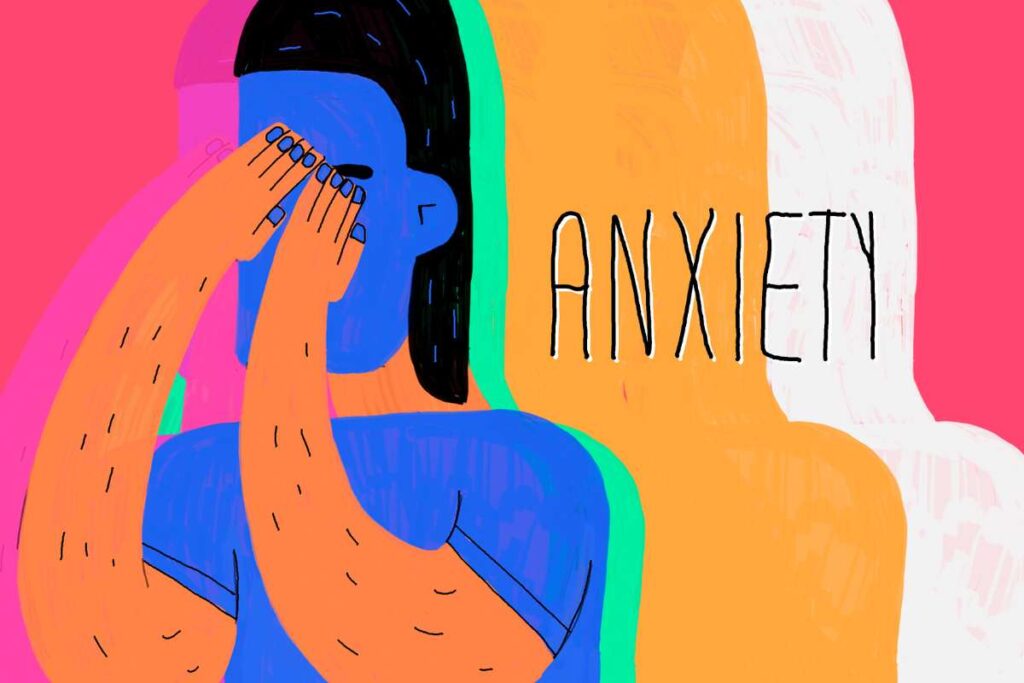Anxiety is something that is part of me,
but it's not who I am.~ Emma Stone
Are you experiencing anxiety for the first time during the menopausal transition? Or, if you’ve experienced it before has it gotten worse? Learn about the types of anxiety disorders, health disparities, and the hormonal connection to menopause. Knowledge is power and can help you make a change for the better for this condition which impacts women more than men!
What is anxiety?
Anxiety is a stress reaction that everyone experiences at some point.
If you’ve ever worried about your health, finances, or family, then you’ve experienced anxiety. It’s part of life, but a part of life for twice as many women+ than men!
There’s a hormonal connection to anxiety, so during the menopause journey your anxiety may increase, or you may experience it for the first time.
In fact, research suggests you may be more likely to report high anxiety symptoms during the menopause journey if you’ve never experienced it before or only experienced low levels of anxiety before this stage of life.
You’re in the right place. pausitive health is here to provide support and information so you know what to expect throughout the menopause journey. Anxiety can make other menopause symptoms (hot flashes, sleep disruption, etc.) worse, and those symptoms can also trigger anxiety.
While anxiety is normal and can be part of the stages of menopause, you need to monitor how you’re feeling to ensure you’re not experiencing too high a level of anxiety too much of the time.
And, if you are – you’re not alone.
What’s an anxiety disorder?
Having too much anxiety could mean you have an anxiety disorder. That’s when you have excessive worrying or fear that does not go away or leads to panic attacks.
Anxiety disorders are the most common mental health condition, affecting 30% of adults at some point in their lives. And, that number may be higher!
One survey suggested that over 80% of adults with certain anxiety disorder symptoms remain undiagnosed.
Anxiety disorders can interfere with almost every aspect of your life – at work, at home, and your social life. How it affects you depends on the type of anxiety and symptoms you have.
Types of anxiety disorders
Your anxiety symptoms may vary depending on the type of anxiety you have. These include:
- Generalized anxiety disorder (GAD)
- Panic disorder
- Other anxiety disorders
Let’s look at each one more in-depth.
Generalized anxiety disorder makes you feel constantly on edge,
even if you're not experiencing any stressful events.
1. Generalized anxiety disorder
Generalized anxiety disorder is when you worry or have fear on most days for at least 6 months.
You may also experience:
- Restlessness
- Fatigue
- Irritability
- Sleeplessness
- Stomach issues
- Headaches and/or muscle aches or pain
- A sense of impending doom
2. Panic disorder
Panic disorder shows up as a sudden and intense fear or anxiety that causes physical reactions known as panic attacks. They can happen unexpectedly with no apparent cause.
Panic attacks can feel so intense that some people think they’re having a heart attack or even dying when it happens.
During a panic attack, you may experience:
- A racing heart
- Chest pain
- Sweating
- Shaking
- Rapid breathing
3. Other anxiety disorders
While less common, there are other anxiety disorders too. They may involve specific fears, called phobias, or specific situations like social or separation anxiety disorder.
Call 9-8-8
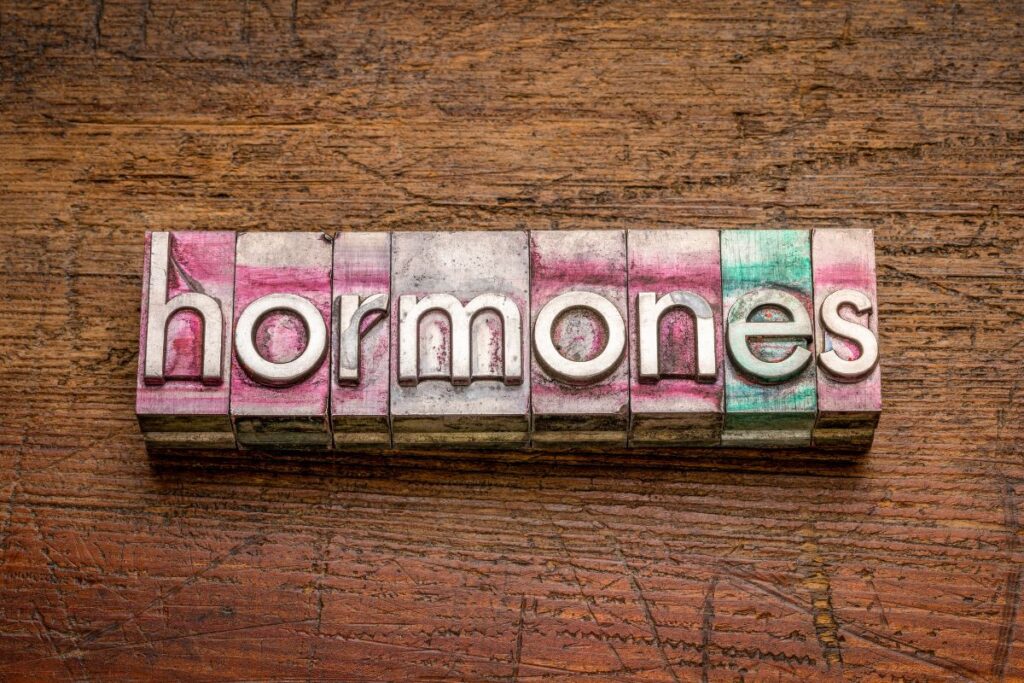
How are hormones and anxiety linked?
Hormonal differences may be the reason women+ are twice as likely as men to suffer from an anxiety disorder.
Your body has over 50 hormones! Hormones are chemical messengers that help regulate multiple body functions, like:
- Blood pressure
- Body temperature
- Metabolism
- Growth
- Mood
Only certain hormones have been linked to anxiety and other mental health conditions. These include:
- Sex hormones
- Estrogen
- Progesterone
- Testosterone
- Stress hormones
- Cortisol
- Adrenaline
- “Happiness hormone”
- Oxytocin
- Thyroid hormones
- Thyroxine (T4)
- Triiodothyronine (T3)
- Thyroid stimulating hormone (TSH)
Let’s explore each one.
Sex hormones
Sex hormones are responsible for maintaining sexual and reproductive health in both males and females. While everyone has all the sex hormones in their bodies, the levels of each hormone are different between men and women+.
Estrogen
Both high and low levels of estrogen are associated with anxiety.
Studies indicate that during the menopause journey, estrogen fluctuates and eventually falls to a new low level causing dozens of symptoms, among them both anxiety and depression.
Progesterone
Progesterone can also contribute to anxiety, especially during the hormonal transition. Progesterone levels have a greater and more rapid decrease than estrogen levels.
Progesterone tends to have an anti-anxiety effect, so low levels can also contribute to the condition.
Testosterone
Testosterone is thought to protect against anxiety and depression, but when it’s high or low, your risk of anxiety can increase.
Since women+ have about a 10 times lower level of testosterone compared to men, they start off at a disadvantage with regard to its protective effects.
Stress hormones
Stress hormones like cortisol are released by the adrenal glands located on top of your kidneys. They help you wake up and maintain energy throughout the day.
Have you noticed you’re feeling more stressed as you age? That may be because of life factors or because stress hormones naturally increase as you age. The menopause journey can also bring on stress and make symptoms worse.
When stress hormones are high, it can lead to anxiety.
Happiness hormone
Oxytocin usually helps create feelings of love, closeness, and well-being. It also helps decrease your stress hormone levels after a stressful event.
As you get older and during the menopause journey, oxytocin levels decrease. That change can cause emotional distress by intensifying negative memories and increasing anxiety.
Thyroid hormones
Thyroid hormones help regulate your energy, metabolism, and growth. They also affect your mood.
So, if your body is producing too much or too little of your thyroid hormones, you could be at greater risk of having mental health issues, including anxiety.
Talk to Your Healthcare Provider About Symptoms
Anxiety health disparities
Health disparities exist between races and ethnicities. Some potential reasons include underdiagnosis or poorer access to quality mental healthcare.
Anxiety not only impacts more women+, but the overall impact and illness burden of anxiety is greater as well. This is particularly the case in white and Hispanic women+, who also tend to have a higher rate of disability related to the condition.
For instance, they are more likely to miss work and be diagnosed with other illnesses, like:
- Bulimia nervosa
- Depression (major depressive disorder)
- Another anxiety disorder
Women+ with anxiety are more likely than men to be prescribed medicine for it, even if it’s the same level of severity. While medication can be helpful, this finding could suggest that other treatment options aren’t being tried or offered first.
Treatments are available, and as a woman+ on the menopause journey, remember it’s important to consider ALL options.
Health disparities among races and ethnicities
Fewer members of the Black and Hispanic populations report having a mental health condition compared to those who are white. However, within a racial group, differences can be seen as well. For example, one study found that almost 62% of Latin American women+ who were post-menopausal also reported having anxiety. That rate is almost twice the rate of anxiety among women+ in general.
And, strikingly, when diagnosed with a mental health condition, white women+ are more likely to receive services for it. Consider these differences in care:
- 1 in 2 white individuals receive care
- 1 in 3 who are Black or Hispanic get care
- 1 in 5 who are Asian receive care
When it comes to actual services received, all racial and ethnic groups of women+ have been found to be offered treatment with medication at similar rates.
But those who are non-Hispanic Black or Hispanic are half as likely to be offered counseling or talk therapy by healthcare practitioners.
There are a variety of treatments available, and as a woman+ on the menopause journey, remember it’s important to consider ALL options.
You are not alone
If you’re feeling anxious during the menopause journey, don’t be alarmed, as you are not alone.
Take your symptoms seriously to prevent them from rising to the level of an anxiety disorder.
Talk with your healthcare practitioner to determine the root cause(s) and ask about treatment options. pausitive health details dozens of options (many of which do not require medication) to manage and treat anxiety.
Remember, the menopause journey is a great time to make a change for the better, one symptom at a time!
For a limited time, you can participate in our menopause journey pilot program, a one-stop destination offering education, virtual care, and other services like digital cognitive behavioral therapy (d-CBT), which has been shown to help with stress, anxiety, and depression.
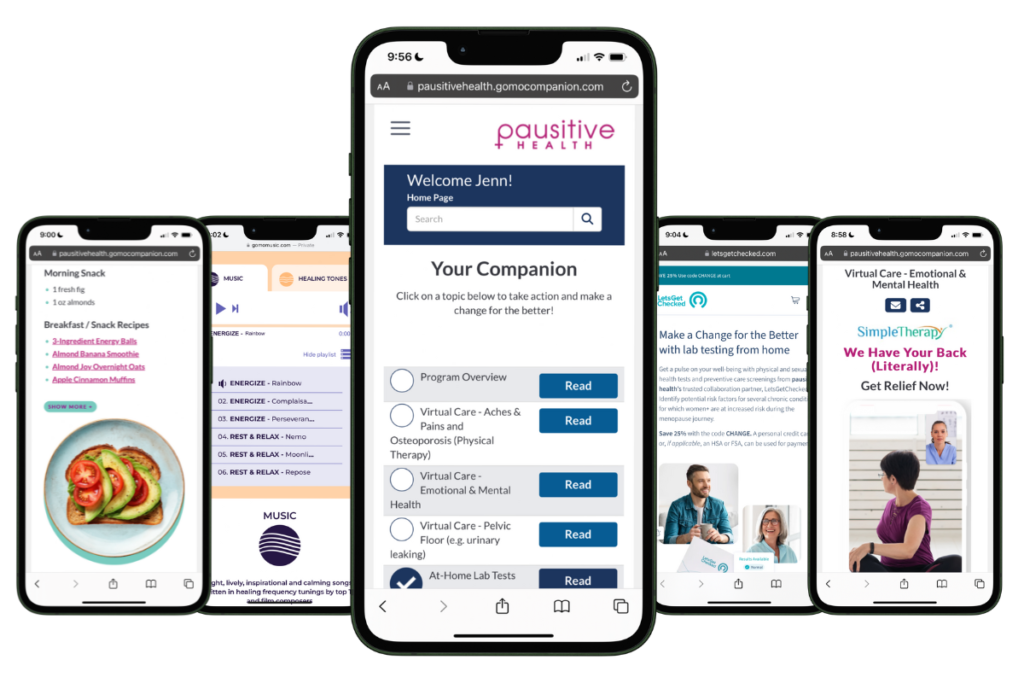
Free Support
For A Limited Time!
pausitive health offers personalized support for every stage of the menopause journey. Customize your experience with 14 evidence-based educational tracks, a diet assessment with recommendations and a food library, solutions for aches and pains, virtual care options, practical lifestyle supports, and a supportive community. All in one trusted place.
Join the pilot and be the first to know when our web-app is coming in 2026!
Facts | Anxiety & Depression Association of America
Bremer E. Anxiety in Menopause: A Qualitative Inquiry. 2018. Dissertation Virginia Commonwealth University.
83% of Adults with Generalized Anxiety Disorder Symptoms Are Undiagnosed | MedPage Today
Any Anxiety Disorder, Anxiety Disorders and Generalized Anxiety Disorder | National Institute of Mental Health
Stanikova D, Luck T, Pabst A, Bae YJ, Hinz A, Glaesmer H, Stanik J, Sacher J, Engel C, Enzenbach C, Wirkner K, Ceglarek U, Thiery J, Kratzsch J, Riedel-Heller SG. Associations Between Anxiety, Body Mass Index, and Sex Hormones in Women. Front Psychiatry. 2019 Jul 4;10:479. doi: 10.3389/fpsyt.2019.00479. PMID: 31333520; PMCID: PMC6620895.
Kundakovic M, Rocks D. Sex hormone fluctuation and increased female risk for depression and anxiety disorders: From clinical evidence to molecular mechanisms. Front Neuroendocrinol. 2022 Jul;66:101010. doi: 10.1016/j.yfrne.2022.101010. Epub 2022 Jun 15. PMID: 35716803; PMCID: PMC9715398.
Hormones, Mental Health and the Mind/Body Connection | Anxiety & Depression Association of America
McLean CP, Asnaani A, Litz BT, Hofmann SG. Gender differences in anxiety disorders: prevalence, course of illness, comorbidity and burden of illness. J Psychiatr Res. 2011 Aug;45(8):1027-35. doi: 10.1016/j.jpsychires.2011.03.006. Epub 2011 Mar 25. PMID: 21439576; PMCID: PMC3135672.
Bacigalupe A, Martín U. Gender inequalities in depression/anxiety and the consumption of psychotropic drugs: Are we medicalising women’s mental health? Scand J Public Health. 2021 May;49(3):317-324. doi: 10.1177/1403494820944736. Epub 2020 Aug 5. PMID: 32755295.
Núñez-Pizarro, Jorge L. MD; González-Luna, Alejandro MD; Mezones-Holguín, Edward MD, MSc; Blümel, Juan E. MD, PhD; Barón, Germán MD; Bencosme, Ascanio MD; Benítez, Zully MD; Bravo, Luz M. MD; Calle, Andrés MD; Flores, Daniel MD; Espinoza, María T. MD; Gómez, Gustavo MD; Hernández-Bueno, José A. MD; Martino, Mabel MD; Lima, Selva MD; Monterrosa, Alvaro MD; Mostajo, Desiree MD; Ojeda, Eliana MD; Onatra, William MD; Sánchez, Hugo MD; Tserotas, Konstantinos MD; Vallejo, María S. MD; Witis, Silvina MD; Zúñiga, María C. MD; Chedraui, Peter MD, PhD. Association between anxiety and severe quality-of-life impairment in postmenopausal women: analysis of a multicenter Latin American cross-sectional study. Menopause 24(6):p 645-652, June 2017. | DOI: 10.1097/GME.0000000000000813
Samander LJ, Harman J. Disparities in Offered Anxiety Treatments Among Minorities. J Prim Care Community Health. 2022 Jan-Dec;13:21501319211065807. doi: 10.1177/21501319211065807. PMID: 34996307; PMCID: PMC8744160.
You may also like…
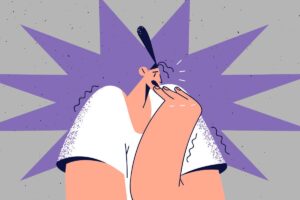
17 Menopausal Anxiety Treatment Options To Ease Your Mind
Feeling anxious during the menopause journey? Try these 16 anxiety treatment options to ease your mind of worry and fear.
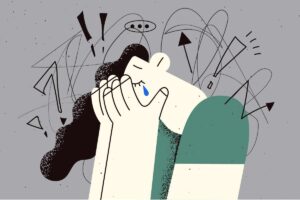
Feeling Anxious? How Anxiety Impacts Menopausal Symptoms and Vice Versa
Are you feeling more anxious during the menopause journey? You are not alone. Learn how it can impact other menopause symptoms too.

How Stress Affects Your Body and Makes Menopause Symptoms Worse
Did you know stress symptoms and menopausal symptoms are similiar?Learn how stress affects your body and how it can mkae menopause symptoms worse.

